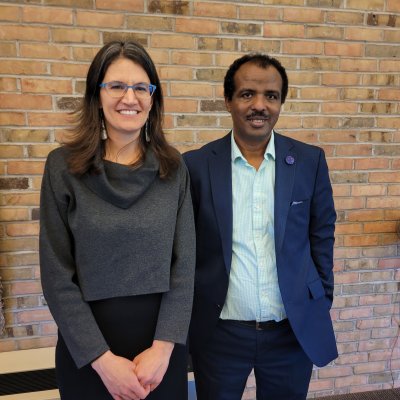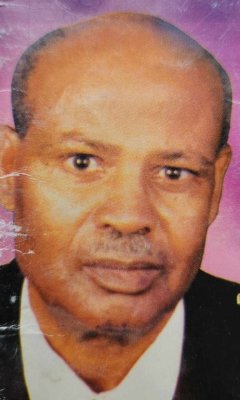Seminary student writes biographies of MKC Ethiopian leaders
By Isaiah Friesen
The ISGA was pleased to have Workineh Ayele Yami, a leader in the Meserete Kristos Church (MKC) in Ethiopia, as a teaching and research intern throughout the recently completed academic year. Workineh is a Master of Arts: Theology and Peace Studies student at Anabaptist Mennonite Biblical Seminary in Elkhart, Indiana.
After teaching a module on MKC history with Goshen College students in the “Anabaptism in Global Context” course, Workineh focused the second semester of his internship on writing the biographies of three MKC leaders for publication in the Global Anabaptist Mennonite Encyclopedia Online (GAMEO). The ISGA is a member of the management board of GAMEO and is committed to expanding content from Anabaptist groups outside of North America.

The Meserete Kristos Church in Ethiopia is the largest national conference within Mennonite World Conference, with more than 500,000 members. Kedir Delchume, Alemu Checole and Kiros Bihon were all prominent leaders in the MKC, but their stories had not yet been published in GAMEO. The choice to research these three leaders was based on Workineh’s personal connection to them, as well as the availability of primary sources like interviews, obituaries, and correspondence.
Workineh chose Alemu as a biography subject because of his connection with the global Anabaptist community. Alemu was blind and one of the first students enrolled in the school for the blind established by Haile Selassie I, where North American Mennonite missionaries were invited to teach.
“When you read that Alemu studied with the first Mennonites who went from Elkhart to Ethiopia, you will see that we are kin,” said Workineh. “I wanted North Americans to feel the relational connection, to feel that we are really related to each other.”
Even though he had known Alemu personally, upon researching Alemu’s story, Workineh was newly inspired to see the difference that education can make. “When teams of people came from the USA to Ethiopia, he was the one who translated sermons, workshops, even research interview transcripts between Amharic and English…. you see the impact of education, how it transforms people. It’s not a matter of physical blindness.”
Kedir Delchume was known as a charismatic and ethical leader, inspiring people by the force of his moral example. Through his research and writing about Kedir, Workineh came to understand transformational leadership as a central aspect of Kedir’s life and ministry.

“Those who knew Kedir quote him as if they were quoting the Bible. People followed him not through some kind of manipulation, but through his example,” Workineh said.
“In the time of persecution, especially, when everyone was leaving the country for the United States, he did not just want to leave the people there and flee away for himself. He said, ‘If I die, I will die here, with the people, [rather than] go away for myself.’ So that makes him a model.”
About Kiros Bihon, Workineh learned from many who were direct witnesses to his humility, kindness, and other attributes. He heard from Kiros’s daughter that he was a good manager, father, and husband. Workineh said that hearing the testimony about Kiros’s life from his daughter and others “makes me feel the presence of the Holy Spirit. It humbles me when stories are being told like this.”
Workineh hopes that these biographies will inspire and draw out readers’ own gifts and potential. “For those who have this inner calling, when they hear this voice, they want to be like Kedir, to be like Alemu, or like Kiros,” said Workineh. “If you have some kind of calling, then when you hear that [voice], you are being motivated by that.”
The three biographies prepared by Workineh will be published in GAMEO in July of this year, accessible to readers worldwide.




